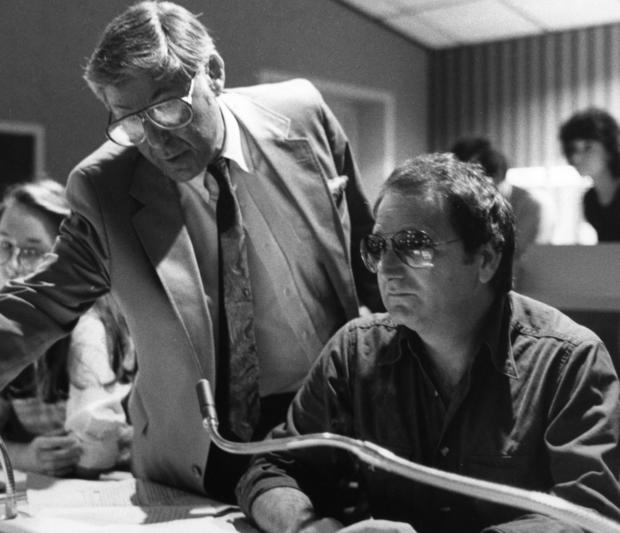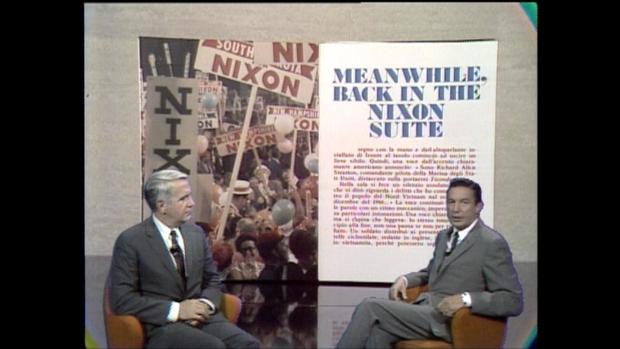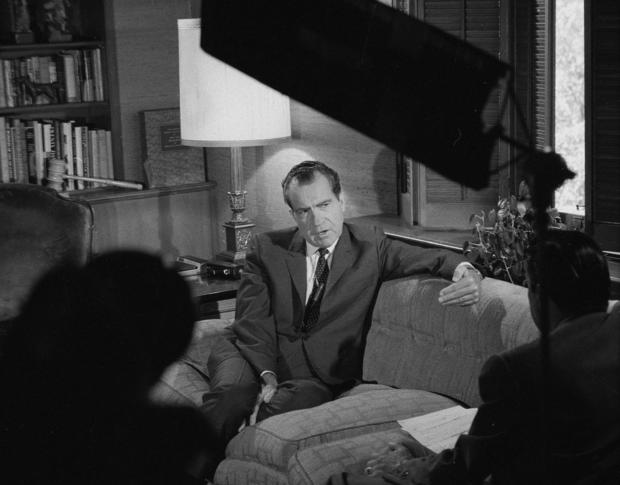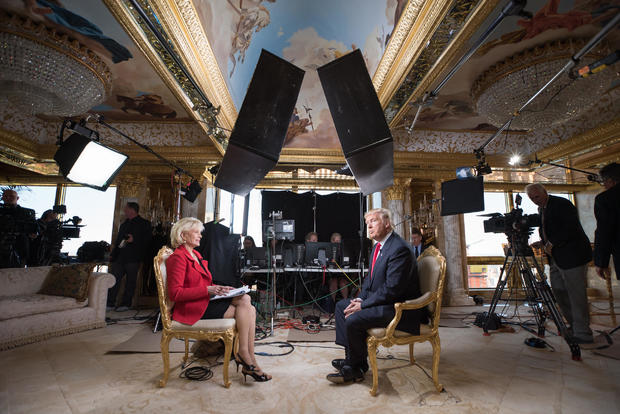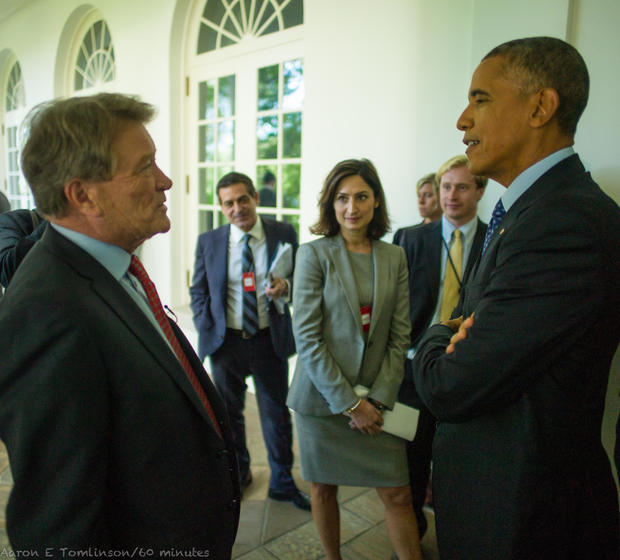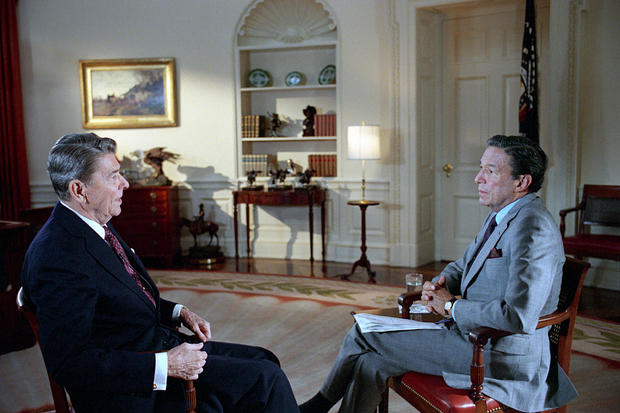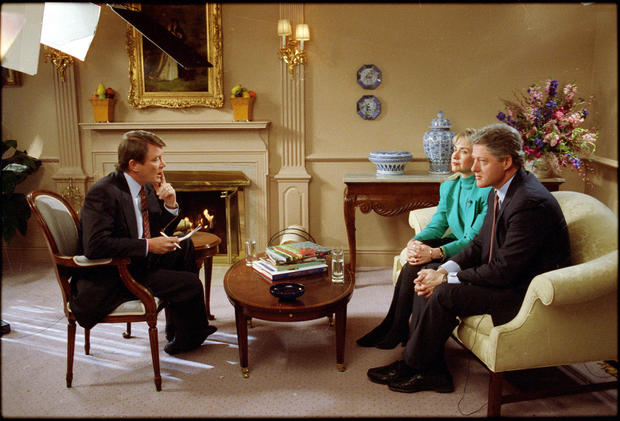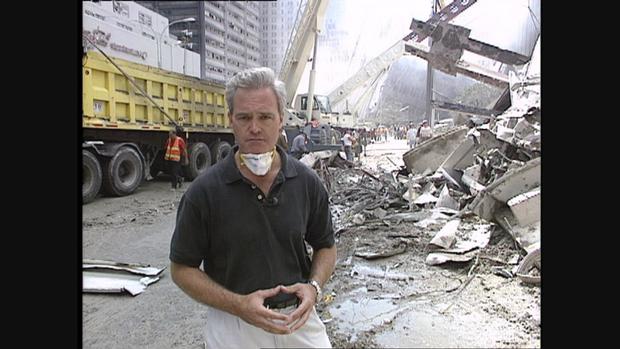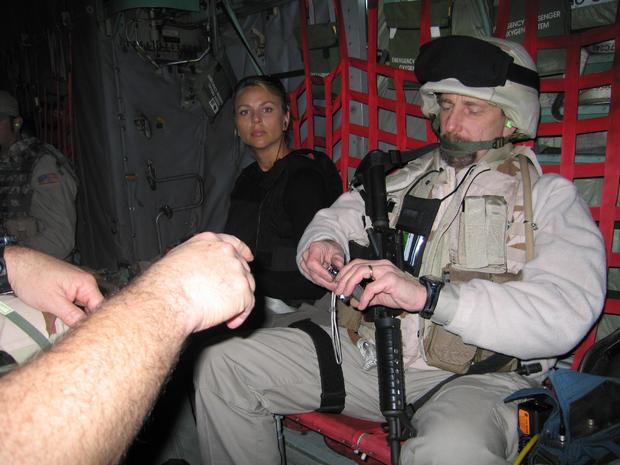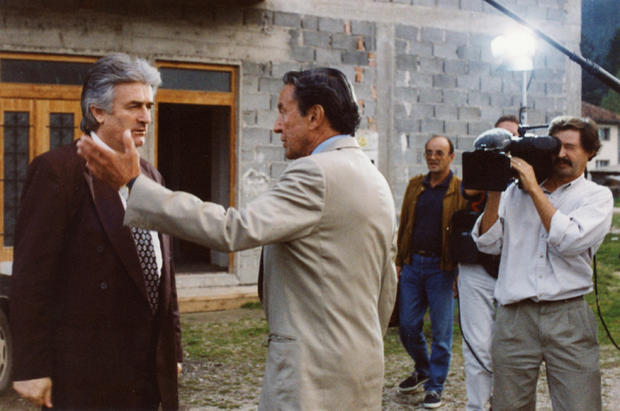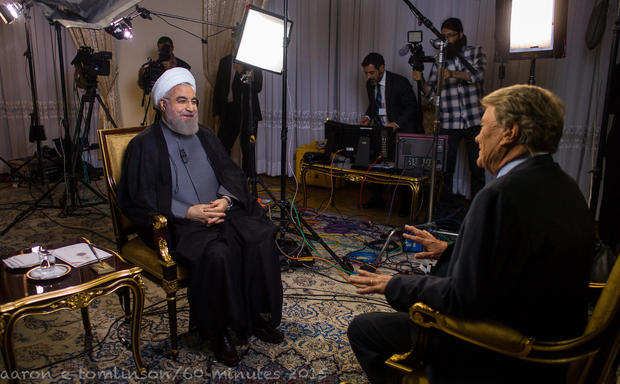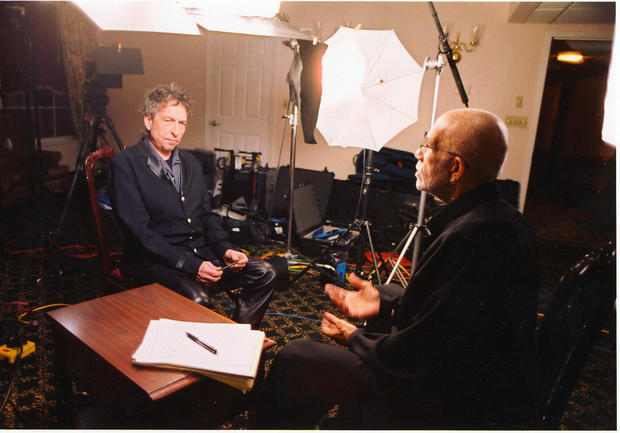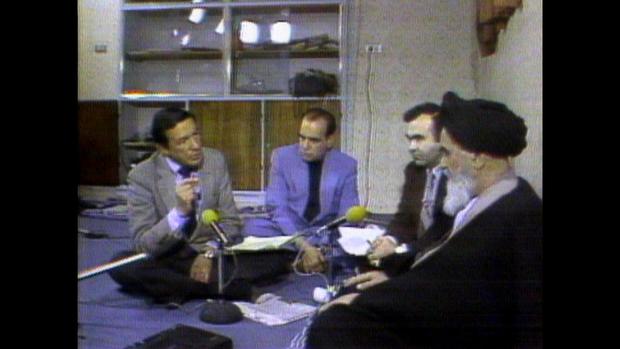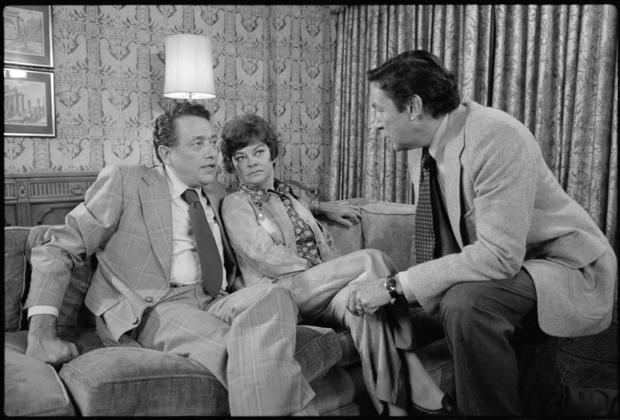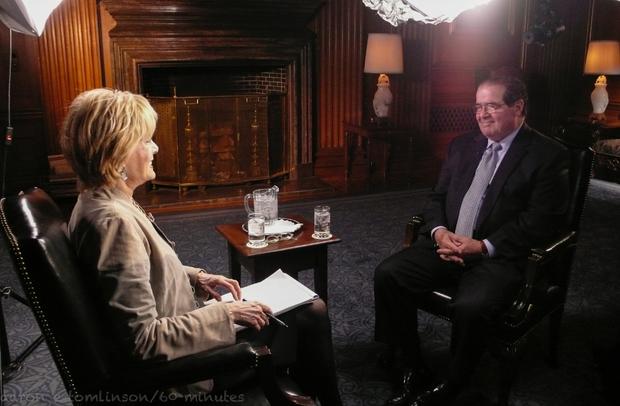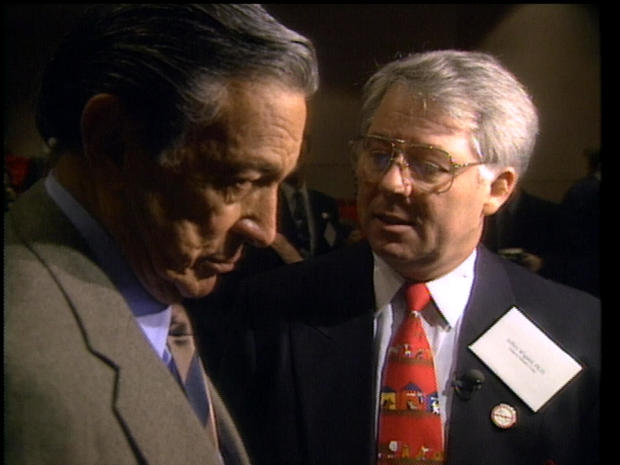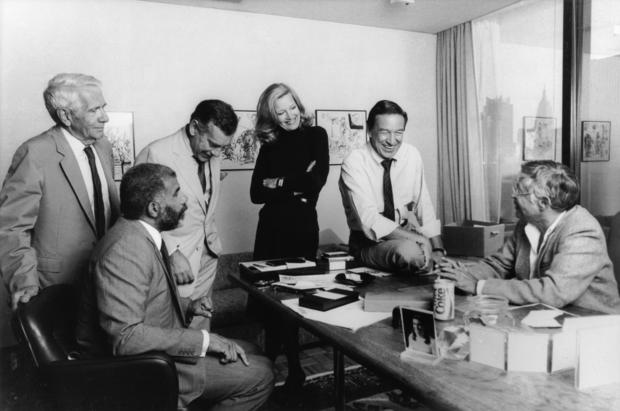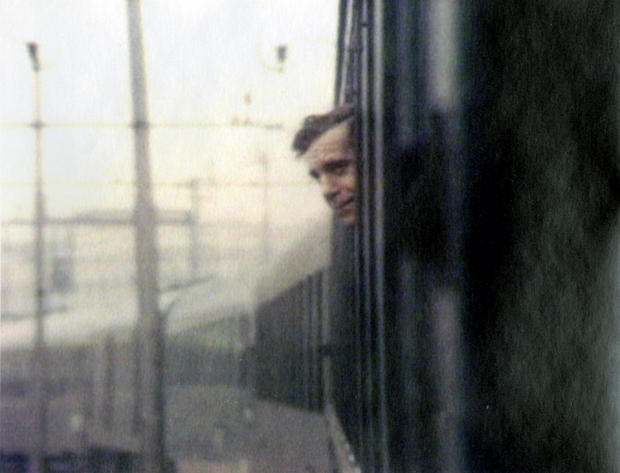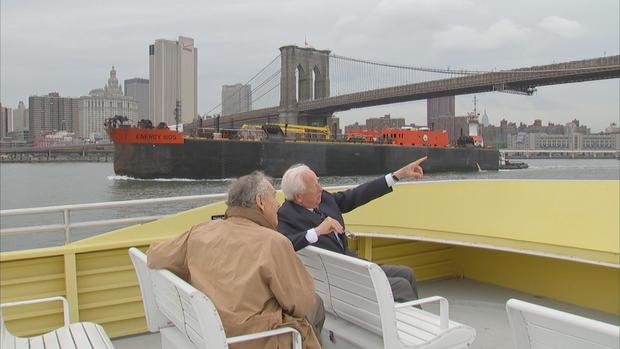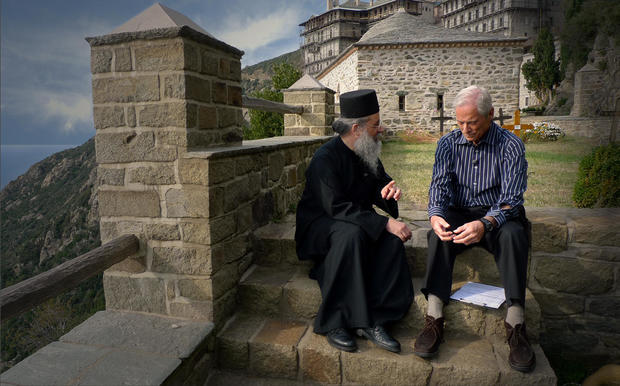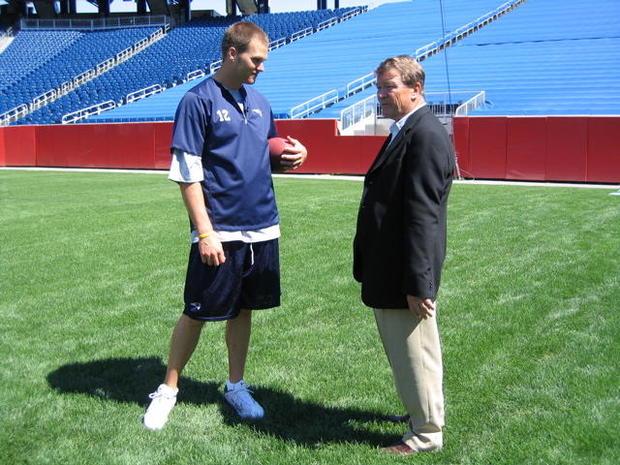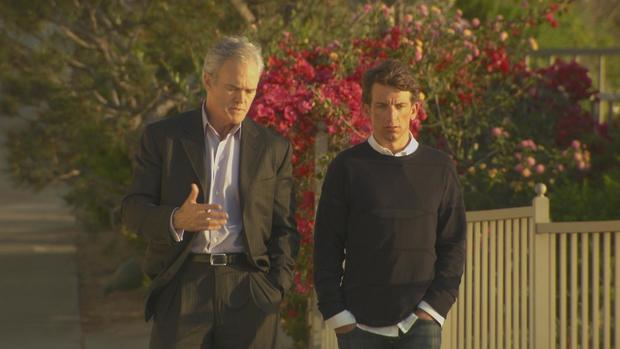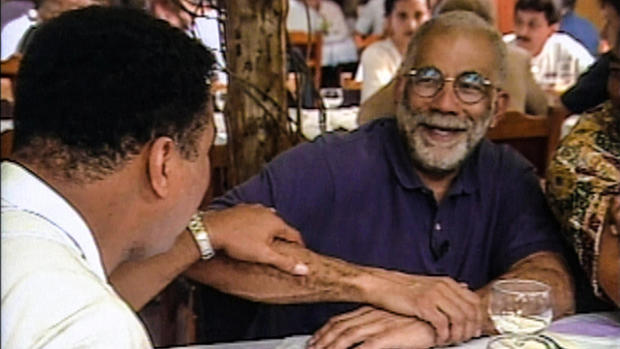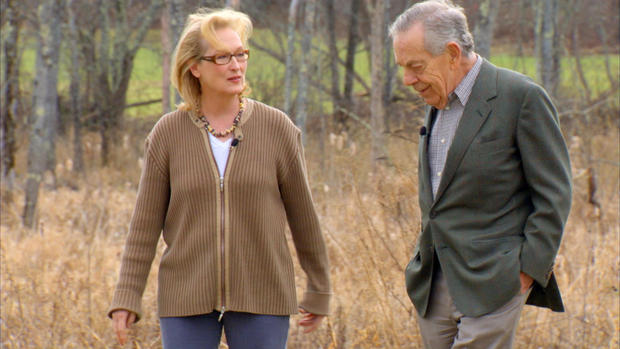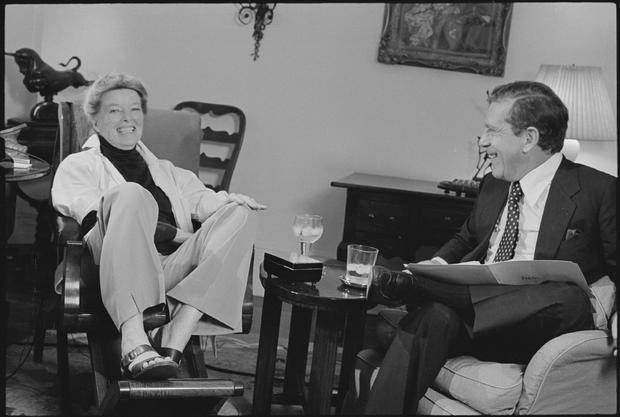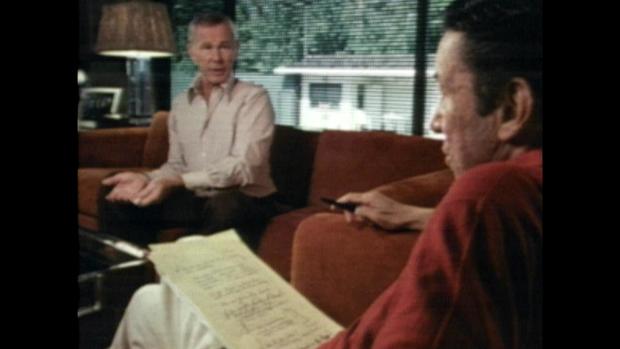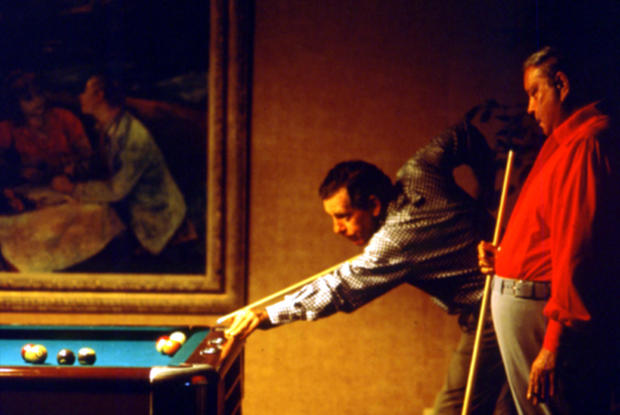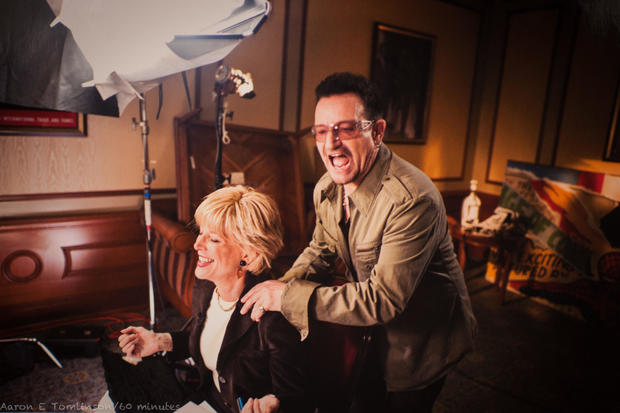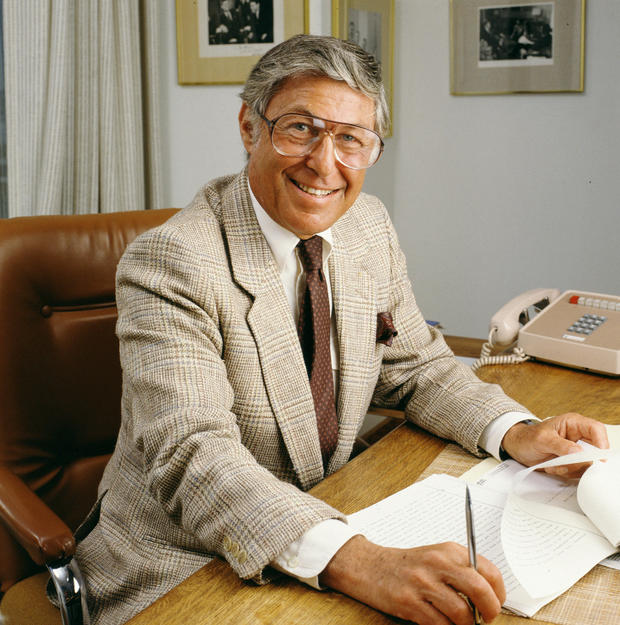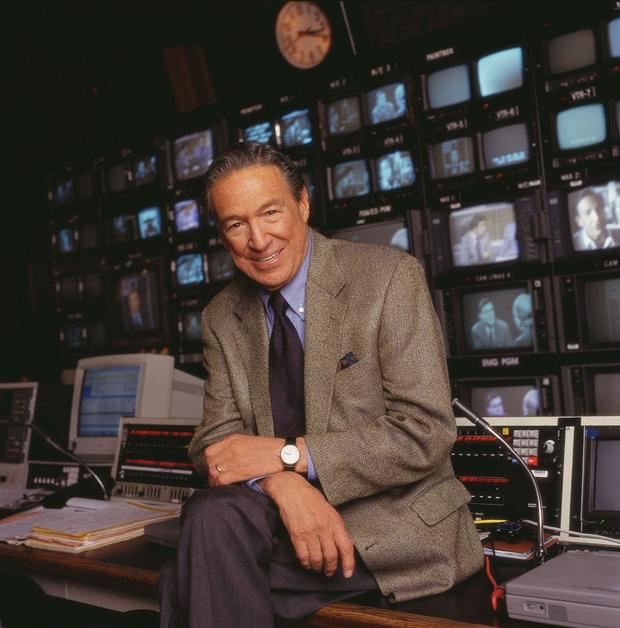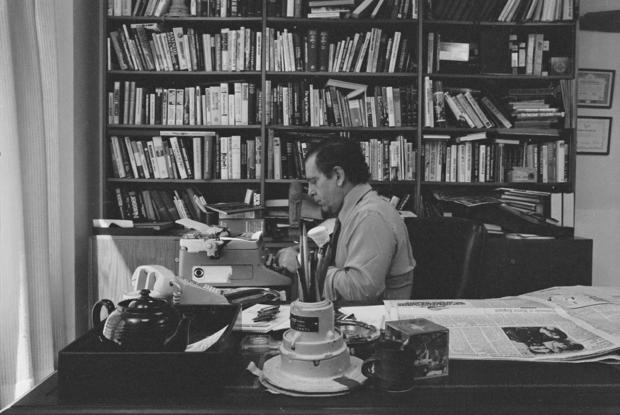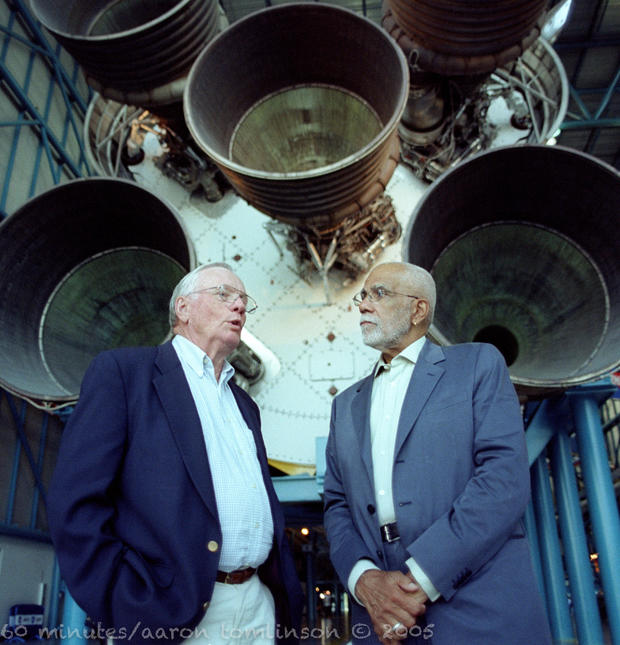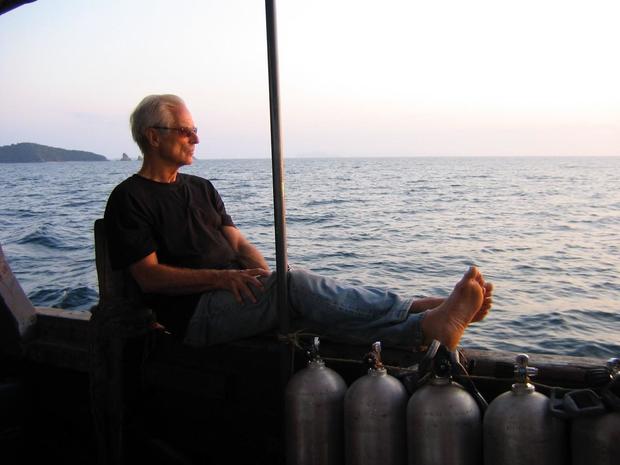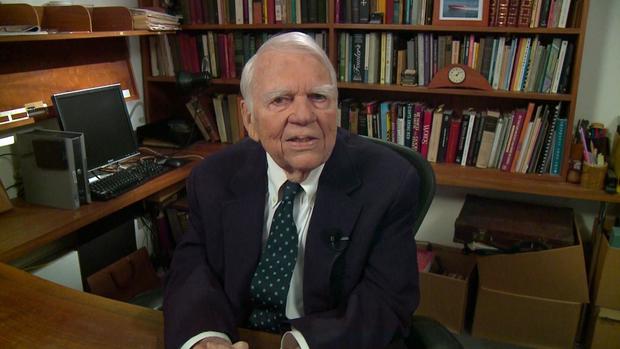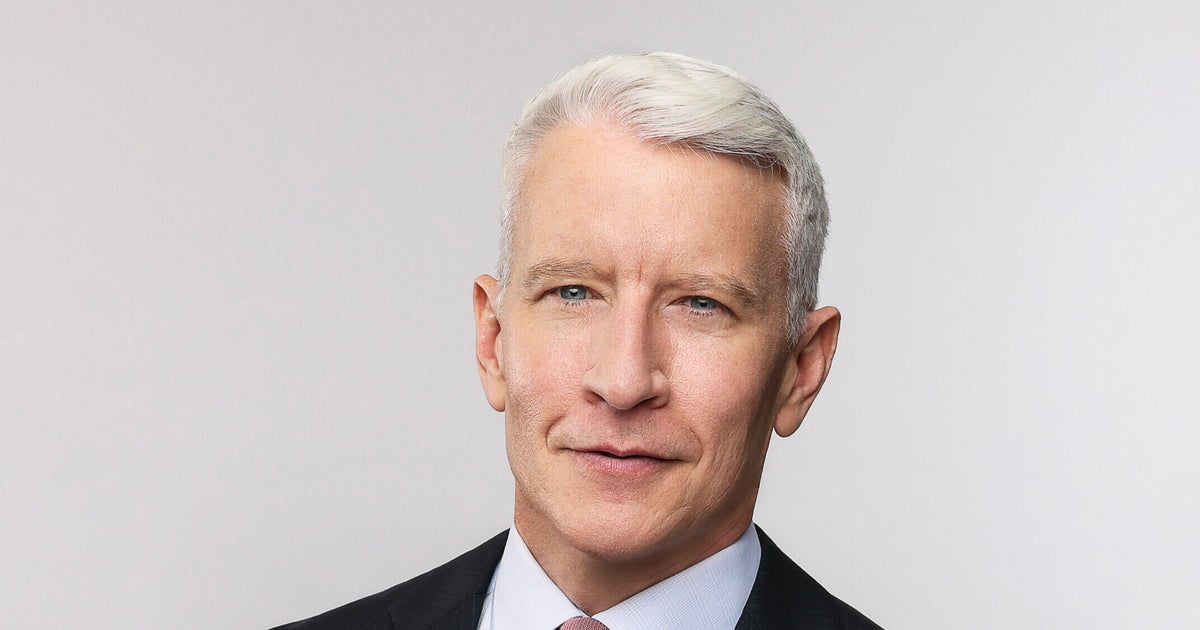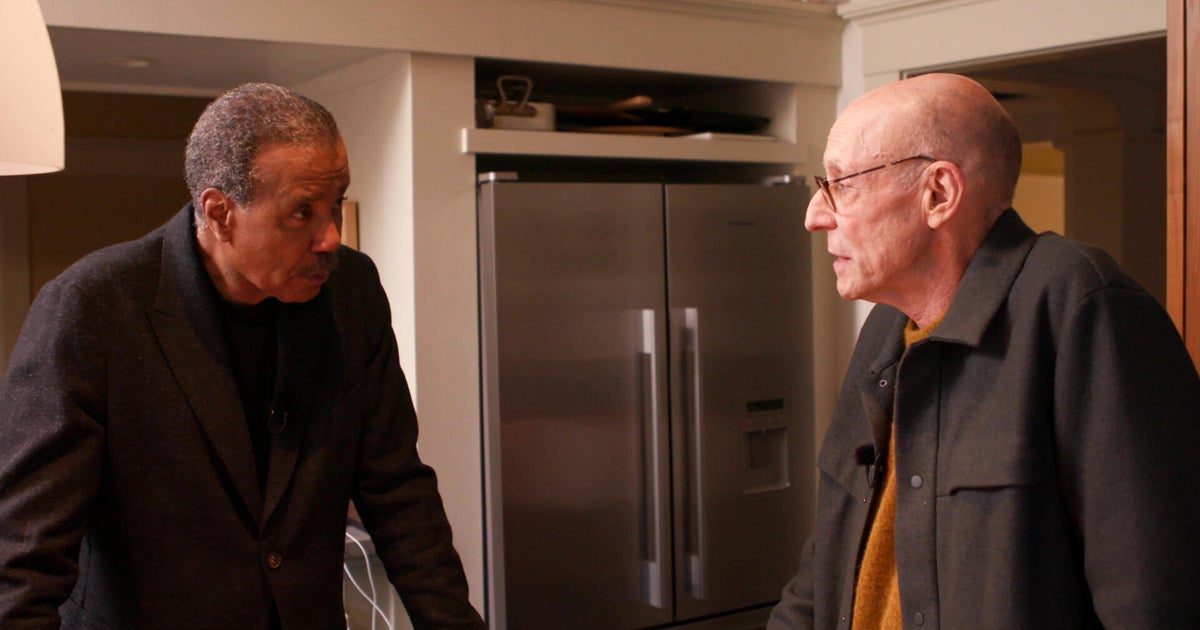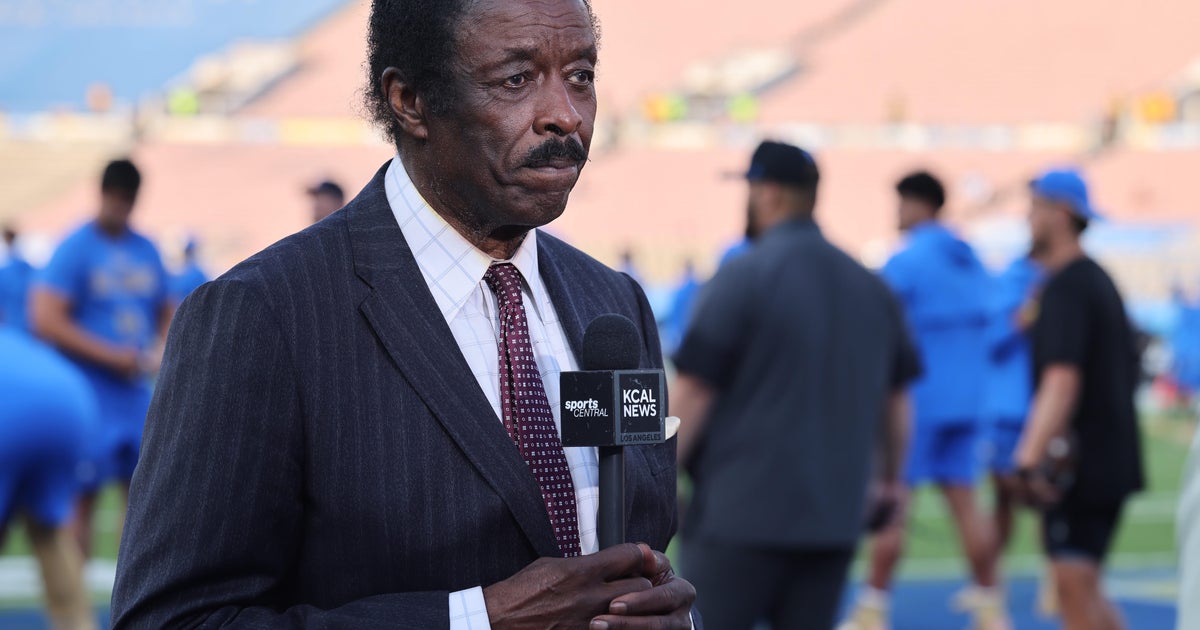50 years of 60 Minutes
Looking back at 50 years of 60 Minutes, it's worth noting that the longest running broadcast in prime time television history was created by a man with a notoriously short attention span. Don Hewitt was bored by hour-long documentaries and thought any story worth telling could be done in ten or 15 minutes. So he dreamed up this broadcast: three different segments, a little something for everyone.
A half a century later, we're here to celebrate Don's very big -- and very successful idea. We'll be profiling 60 Minutes itself: inside stories about its history and its greatest moments. From the archives, we'll have some outtakes and backstage footage you've never seen before. And interviews we've done over the years with the 60 Minutes pioneers who are gone now, but whose stamp on the broadcast is still on display, every Sunday night.
The formula for a good 60 Minutes story: keep it timely, keep it relevant and never be dull.
"When we cover a story and report it on Sunday night and it has impact on Monday morning, that's what you hope for."
Some examples, from this 50th season.
Puerto Rico in the aftermath of Hurricane Maria. We surveyed the damage with the island's governor, Ricardo Rossello.
Steve Kroft: There was no safe haven.
Ricardo Rossello: There was no safe haven.
Just a few weeks earlier, it had been Houston's turn. Scott Pelley found widespread dismay that the city's flood control system was no match for Hurricane Harvey.
Cynthia Nealy: It's gonna rain, we're gonna have hurricanes and tropical storms, so by golly, do something to protect your people from it.
Also this year: an old warrior's last stand. Lesley Stahl with John McCain.
Lesley Stahl: I had to ask him about cancer, he didn't want to go there and I was pushing him there.
John McCain: I have feelings sometimes of fear of what happens. But as soon as I get that, I say wait a minute. You've been around a long time old man. You've had a great life.
Bill Whitaker's recent story with producer Ira Rosen about the opioid crisis got Washington's attention.
Joe Rannazzisi: This is an industry that's out of control. If they don't follow the law in drug supply, people die.
Joe Rannazzisi once ran the DEA's war on the illicit sale of prescription drugs. A war undermined - on Capitol Hill.
An investigation by 60 Minutes and the Washington Post found that under heavy lobbying by the drug industry, lawmakers quietly passed a bill last year making it more difficult to stop the sale of addictive pain pills to shady pharmacies and doctors.
Bill Whitaker: Congressman Tom Marino, who pushed this legislation through Congress, was tapped by the Trump Administration to be the new drug czar. And two days after the story ran -- Congressman Marino withdraws his name from being considered. And I would like to think that our story had something to do with that.
Jeff Fager: We want to be relevant we want to be current we want to be about today's news.
Jeff Fager succeeded Don Hewitt in 2004 as executive producer of 60 Minutes.
Jeff Fager: And when we cover a story and report it on Sunday night and it has impact on Monday morning, that's what you hope for.
Over the years we've landed timely interviews with world leaders.
Putin of Russia.
Assad of Syria.
Saddam Hussein, with Dan Rather in 2003. The Iraqi leader denied having weapons of mass destruction, a key justification for the impending American invasion.
Saddam Hussein: I think America and the world also knows that Iraq no longer has the weapons.
It was a controversial interview. But events would prove that what Saddam said about the weapons was correct.
In 2015 Pope Francis was about to embark on a trip to the United States. A big story and a rare opportunity for a few questions from 60 Minutes.
Scott Pelley: What is your goal for America?
To meet people, he told us, just to meet with them.
Jeff Fager: I think we're more current now than we were in past years but the values and the standards that we live by are the same as they were the very first broadcast that went on the air in 1968.
The Beginning
Some behind the scenes footage of the taping of that first broadcast has survived. It began with Harry Reasoner getting rid of a cigarette.
It was, after all, the 60's.
Harry and Mike Wallace thought the introduction was perfect.
Don Hewitt: Mike, I wanna do it again, you're sitting...
But in the control room, Don Hewitt wasn't happy with the way Mike was sitting.
And as always, Don got what Don wanted. He was a brash and brilliant man, who not only came up the idea for the broadcast, but ran it for 36 years.
And on this day they rolled the tape again -- and rolled the dice on Don's grand experiment.
Harry Reasoner: This is 60 Minutes. It's a kind of a magazine for television.
And the very first story set the tone for what was to come. 60 Minutes had the only camera in the room as Richard Nixon and friends watched the vote at the Republican Convention. It gave him the nomination for president.
Interviewed by Mike on the second program, the candidate made a remark that history would note.
Richard Nixon: The most important thing about a public man is not whether he's loved or disliked, but by whether he's respected. And I hope to restore respect to the presidency at all levels by my conduct.
"You're putting words in my mouth, Mike Wallace."
Virtually all of the presidents of the last half-century have fielded questions on the broadcast.
Lesley Stahl: Are you really gonna build a wall?
Donald Trump: Yes.
Lesley got the first television interview with Donald Trump shortly after he won the 2016 election.
Lesley Stahl: Are people gonna be surprised about how you conduct yourself as President?
Donald Trump: Ya know, I'll conduct myself, um, in a very good manner.
Lesley Stahl: He was thoughtful. He answered all my questions.
Lesley Stahl: But are you gonna be tweeting?
Donald Trump: I'm gonna do very restrained if I use it at all…
Lesley Stahl: And I thought, ok he's not gonna tweet anymore. We're gonna see something completely different. Got that wrong.
We interviewed Barack Obama 18 times.
Steve Kroft: Very smart man. Always a pleasure to interview. He was always in the moment, thoughtful and, um, relaxed. I don't kid myself. The reason he did so many stories with us was because of 60 Minutes, not because of me. Because of the power and influence of the show.
Mike had known Ronald and Nancy Reagan for years.
Mike Wallace: Nancy, of course, was an old, dear friend of mine.
He'd worked with her mother in his early radio days. Even so, Mrs. Reagan gave as good as she got in their interviews.
Nancy Reagan: You're putting words in my mouth, Mike Wallace.
Mike Wallace: You can take them out right now.
And in a 2006 interview, Mike had no use for the idea that Mr. Reagan was a lightweight.
Mike Wallace: Baloney. He knew enough to bring an end to the Cold War.
An important interview for the Clintons in 1992, when Bill was running for president.
34 million people watched as the couple fielded questions about Gennifer Flowers.
Steve Kroft: She's alleging a 12-year affair with you.
Bill Clinton: That allegation is false.
Hillary Clinton: Ya know I'm not sitting here like some little woman standing by my man like Tammy Wynette. I'm sitting here because I love him.
And for added drama, a light fell off the wall and nearly hit them.
No one was hurt, but it was a close call.
An unusual presidential interview, recalling a dark time. Scott Pelley and George W. Bush on Air Force One -- on the first anniversary of 9-11.
George W. Bush: I can remember sitting right here in this office and realizing it was a defining moment in the history of the United States. I knew we were at war.
Scott had seen first-hand the horror of that September morning.
Scott Pelley: I spent about two weeks at ground zero, reporting continuously. The agony of watching these firefighters digging through, trying to find somebody alive. It was a mountain of misery.
For nearly two decades, the most important and dangerous assignments for 60 Minutes correspondents and crews have been covering the seemingly endless cycle of violence in the Middle East.
For 15 years Lara Logan has covered Iraq and Afghanistan for 60 Minutes and 60 Minutes II.
Most recently, she was in Mosul, during the successful campaign to retake the Iraqi city from ISIS.
Lara Logan: I think we were there just a few minutes before you heard "car bomb, car bomb". And you know it means suicide car bomb… And everyone's shooting because the only thing that can stop that vehicle reaching its target is a hail of gunfire. And it's terrifying.
The 60 Minutes crew took cover in a house commandeered by Iraqi special forces. The car had exploded just 50 feet away.
With war, came refugees. By land and by sea.
Thousands landed on the Greek island of Lesbos, after a dangerous trip across the Aegean Sea from Turkey.
Anderson Cooper was there.
Anderson Cooper: It was an extraordinary thing to witness… So many of them were just exhausted and afraid. People drown on the way over all the time. They're buried in unmarked graves and to die without your name being known in a foreign land and your family doesn't even know what happened to you, to me, that's - an unspeakable tragedy.
The Interviews
Television is, of course, a feast for the eyes. An electronic window on the world. But at the heart of every great 60 Minutes story are the interviews.
"My job is to put someone in the chair and get them to talk and tell their story as if there are no cameras, no lights, not seven people in the room. Just the two of us sitting there talking."
Scott Pelley with one of the men who shot Osama bin Laden.
Scott Pelley: You shot him
Mark Owen: A handful of times
Pelley: And at that point, his body was still.
Mark Owen: Yes.
You have to ask the right questions and you have to be fast on your feet.
Lara Logan: How many times have you been indicted?
Morley Safer: What goes through your mind?
Lesley Stahl: What is it with you?
Mike Wallace: You demanded special treatment.
Steve Kroft: Did you think you were gonna get away with it?
Scott Pelley: That's not all that's going on here.
Bill Whitaker: It almost seems unbelievable.
There are rules for conducting a 60 minutes interview. Number one: do your homework.
Mike Wallace: Let's get this straight.
Bob Simon: Talk to us for a minute
Number two: don't be shy.
Bob Simon: The prosecution says you're a con man. A thief.
Number three: take your time.
Wear them down, if need be.
Lesley Stahl: Let me interrupt you.
And even when you've mastered all that, it's still not as easy as it looks.
Ed Bradley: What kind of person would do that? Those are the facts, they're not in dispute. Does that seem strange?
Ed Bradley explained in 2001.
Ed found Mick Jagger candid - and funny.
Ed Bradley: The cliché that was associated with the band for so many years - sex, drugs, and rock n roll is - you're beyond that?
Mick Jagger: Some of that's still in there, I think.
Bob Dylan was something else.
Ed Bradley: You know, Bob Dylan hadn't done a television interview in, I guess, almost 20 years.
Ed Bradley, speaking to Bob Dylan: I read somewhere that you wrote Blowin' In The Wind in ten minutes. Is that right?
Bob Dylan: Probably.
Ed Bradley: Sometimes you'd ask a question and he'd say "yep." You know, you wanna say "C'mon Bob, give it up, give it up.
Mike Wallace, of course, was the very model of the hard-nosed reporter asking point-blank questions.
Mike Wallace: When you boil it down to low gravy it's quite apparent that somethin' was goin' on there.
There was his famous encounter -- during the Iranian hostage crisis of 1979 -- with Iran's Ayatollah Khomeini. Mike asking him, in essence, if he was nuts.
Mike Wallace: President Sadat of Egypt calls you, Imam, -- forgive me, his words, not mine -- a lunatic.
Mike remembered getting a non-answer and icy stares from the other Iranians in the room.
Mike Wallace: Well the guy that was translating, he looked over at me and said, "You're the lunatic if you think I'm going to translate that question to the Ayatollah." He did and it got the Ayatollah's attention for the first time.
One of Mike's finest hours came 42 years ago, talking to Clint Hill, one of the secret service agents protecting John Kennedy in Dallas the day the president was shot.
Mike Wallace: Was there anything that the Secret Service or that Clint Hill could have done to keep that from happening?
Clint Hill: Clint Hill, yes.
Hill was on the running board of the car just behind the president.
Clint Hill: If I had reacted about maybe a second faster, I wouldn't be here today.
Mike Wallace: You mean, you would have gotten there and you would have taken the shot?
Clint Hill: The third shot, yes sir.
As it was, he'd made it to the car in five seconds, just as the fatal shot rang out. The guilt consumed him for years.
Clint Hill: It's my fault.
Mike Wallace: Oh, no one has ever suggested that for an instant. What you did was show great bravery and great presence of mind.
Clint Hill: Mike, I don't care about that. If I had reacted just a little bit quicker -- and I could have, I guess. And I'll live with that to my grave.
Jeff Fager: It's not always easy to get people to talk, and to open up the way Clint Hill did. That took a long time and Mike Wallace was very patient and sometimes, and Ed Bradley used to say this, sometimes you just have to wait for them to talk.
In Washington, a very talkative town, there's one group that's long been camera-shy: the justices of the U.S. Supreme Court. But in recent years, several of them have appeared on 60 Minutes.
The late Antonin Scalia in 2008. Lesley took him back to his grade school.
Lesley Stahl: Straight "A's"? The whole time? Come on.
Antonin Scalia: Would I lie?
Lesley Stahl: No.
Antonin Scalia: If you can't trust me, who can you trust, right?
Scalia's fellow conservative, Justice Clarence Thomas, grew up poor in Georgia.
Steve Kroft: Indoor plumbing?
Clarence Thomas: No, goodness, no. There was an outhouse that we shared with some other families.
Justice Sonia Sotomayor's parents immigrated from Puerto Rico. She grew up in a public housing project in New York.
Scott Pelley: You know, your brother told us that more than once in this neighborhood he got beaten up.
Sonia Sotomayor: Yep. And more than once I beat up the person who beat him up.
The Investigations
60 Minutes has done its fair share of exposes, large and small.
We blew the whistle on insider trading in Congress and the never-ending parade of small-time cons. Like turning back the odometers on used cars to get a better price.
"The good news is we're not cops... The bad news is, we're 60 Minutes."
Steve Kroft: This is not exactly legal, right?
Bill Whitlow: This is not exactly legal, no.
Bill Whitlow told us how it's done and we showed him how we do it.
Steve Kroft: See that picture? There's a TV camera back there.
Bill Whitlow: Yep.
Steve Kroft: The good news is we're not cops.
Bill Whitlow: Well, I didn't think so.
Steve Kroft: The bad news is, we're 60 Minutes.
Steve Kroft: Sometimes you have to ruin somebody's day. But it's always somebody who deserves to have their day ruined… He did six years in prison for that.
But it was Mike, of course, who pioneered the art of confronting the bad guys.
Mike Wallace: Track 'em down, follow them into the office or into a barroom or whatever.
It became a trademark for the broadcast and got to the point that just a glimpse of anyone from 60 Minutes produced panic in the streets.
Gradually, the broadcast backed away from ambushes and hidden cameras except when it's the only way to get the story.
Like this one: an especially cruel scam, selling phony stem cell cures to people with devastating illnesses.
Steve Watters: If I opt for the permanent fix, will it keep me out of the wheelchair?
Larry Stowe: Oh yeah.
Scott Pelley: You know, Mister Stowe, the trouble is that you're a con man.
Larry Stowe: Really?
Scott Pelley: [Larry Stowe] was just selling biochemical garbage that he was putting in these people's veins. And he was taking their money from them, 100 thousand dollars, cash only.
Because of the story, Stowe is serving a six-year sentence in federal prison.
Over the years we've tackled some tough investigative reports. In 2006, Ed Bradley examined the racially charged case involving three Duke University lacrosse players falsely accused of rape.
Ed Bradley: The evidence we've seen reveals disturbing facts about the conduct of the police and the district attorney and raises serious concerns about whether or not a rape even occurred.
Ed and the 60 Minutes producers spent six months going over the records of the case, the timeline, photos, medical tests on the accuser -- and concluded there had been a rush to judgment.
The charges were dropped, and the district attorney was disbarred.
The story Mike and producer Lowell Bergman did in 1996 with whistleblower Jeffrey Wigand told how the tobacco industry lied about the dangers of smoking. A story so controversial that CBS corporate lawyers blocked its broadcast for months, fearing a huge lawsuit.
Jeff Fager: The company said, "You can't air it." It's the only time that ever happened in the 50 years of 60 Minutes.
After Wigand's disclosures were published elsewhere, the report finally ran.
Jeffery Wigand: It's a delivery device for nicotine.
Mike Wallace: A delivery device for nicotine? Put it in your mouth, light it up, and you're gonna get your fix?
Jeffery Wigand: You'll get your fix.
Jeff Fager: It's incredible in retrospect because the story itself about tobacco was as important as stories get.
From the start, the 60 Minutes reporting on the tobacco story was rock solid. But there have been some other cases where stories we've broadcast were on shaky ground, containing serious flaws.
There was 'The Mule', a 1997 story about smuggling heroin from Colombia to London. The footage came from an award-winning British documentary which turned out to be fake, with paid actors playing the drug dealers.
A 2004 report on 60 Minutes II suggested George W. Bush got preferential treatment in the Texas Air National Guard. It was based in part on documents that came into question and could not be verified.
And a 2013 story about the attack on the American diplomatic compound in Benghazi, Libya was built around an interview with a supposed eyewitness who, as it turned out, had lied. Fortunately, the mistakes have been few and far between.
Jeff Fager: I think the most important thing is to own up to it, to help the viewer understand how we made the mistake, and to move on, one story at a time, earning our credibility back.
The Locations
The first few seasons of 60 Minutes were a period of trial and error: trying to figure out what worked and what didn't. The stories were sometimes vague, sometimes ponderous -- and despite Don Hewitt's best efforts -- sometimes boring. The audience was small, but CBS stuck with the broadcast, often scheduling it in sacrificial time slots when most of America was watching a hit show somewhere else.
As the broadcast evolved, one thing that did work -- and works to this day -- is the travelogue. Trips to exotic places, foreign and domestic. You'd think that, after half a century, we'd run out of destinations. But there's always something new under the sun.
Just about every day of the year, somewhere on earth, there's a 60 Minutes crew at work. Documenting the beauties of nature and the landmarks of ancient history. Our cameras have been to the top of the world and the bottom of the sea.
In the waters off Capetown, South Africa, Anderson Cooper went swimming with the sharks.
Anderson Cooper: Diving with great white sharks is among the stupidest things you can do.
But shark expert Mike Rutzen believes they're smart, curious and not as threatening as you'd think.
Rutzen studies the great whites with no cage, no protection. Anderson did the same.
Anderson Cooper: I would do it again, but it was really scary. Yeah. I don't know if I'd do it again, actually.
"You get to travel the world... and somebody else is paying for it. Is there a better job than that?"
In 2010 we hiked to the edge of an active volcano in Iceland. The eruption sent a huge cloud of ash and rocks the size of cars a thousand feet into the air.
Scott Pelley: Look at the earth just erupting up into the sky.
In 2007, Bob Simon and producer Draggan Mihailovich landed in a remote village in New Guinea, to a hero's welcome.
But the original pathfinder for 60 Minutes was Morley Safer. The most prolific -- and entertaining -- tour guide of all.
One of his first journeys was sailing the Indian Ocean.
Morley Safer: It is on rare days like this that you must ask, "Do they really pay me to do this?" Yes!
In Finland, Morley and producer John Tiffin found that, for some reason, the tango was all the rage. But they found the Argentinian dance didn't quite translate.
Morley Safer: It's a sad shuffle in a minor key. With lyrics to reaffirm a couple's instinctive sense of hopelessness.
Morley loved art and knew his way around the galleries and museums. There was no better companion for viewing the sublime -- and what he considered the ridiculous.
He'd take a shot every once in awhile at the pretensions of the modern art establishment.
And then he'd move on, to the next airplane. And, as he later recalled, to the next adventure.
Morley Safer: You get to travel the world, you get to meet some of the world's most atrocious people and some of the world's most interesting ones and somebody else is paying for it. Is there a better job than that?
Bob Simon felt the same way.
Six years ago, he traveled into the past for one of his favorite stories. Visiting Mount Athos -- home to ancient Greek monasteries seldom seen by outsiders.
During his long career at CBS News, Bob covered dozens of wars and rebellions, from Vietnam to the West Bank to Tiananmen Square.
But in his later years, he was ready for something more peaceful.
And carved out a role for himself as the Doctor Doolittle of 60 Minutes. The wildlife editor.
Bob talked about it in 2011.
Bob Simon: An animal is never duplicitous. An animal will never get involved in gratuitous cruelty. And, uh, it's very refreshing to go see them after you've spent a lot of time interviewing politicians.
He went to Central Africa, where scientists are beginning to understand how elephants communicate.
He went to a remote corner of Brazil in search of jaguars in the wild.
Bob Simon: We happened to be there as a jaguar swam from one side of the river to the other. It was a once-in-a-lifetime shot in the dark.
He traveled to the edge of the north pole with filmmaker John Downer, whose remote cameras record life among the polar bears.
But elephants were his favorite. He and producers Michael Gavshon and Harry Radliffe did three stories on them.
Bob Simon: You fall in love with them, and you don't want anyone to hurt them.
But as 60 Minutes has reported over the years, African elephants and giraffes are slaughtered by poachers. Other species are affected by climate change and encroaching civilization. Their numbers are dwindling.
Bob Simon: We would like to see wild animals survive. That's one of the few editorial positions we can take and get away with. And anyone who disagrees with us, feel free to write a letter.
The Stars
Don Hewitt's model for 60 Minutes was Life magazine. Back in the day, Life did serious stories and picture essays each week -- as well as interviews with movie stars, athletes, and other celebrities. Don figured the mix would work well on television -- and he was right. Many of the best profiles we've broadcast feature the big names from the studios, the stadiums and the playing fields of America.
Tiger Woods, at the top of his game.
Lebron James, self-proclaimed king of the basketball court, showing Steve why.
Tom Brady. You would think that being called the greatest quarterback ever -- as he often is -- would be the ultimate, but...
Tom Brady: Me, I think, "God, there's gotta be more than this."
Steve Kroft: What's the answer?
Tom Brady: I wish I knew. I wish I knew.
In 2005, Mike did an interview that turned the spotlight on the darker side of sports.
Mike Wallace: What you are saying is that the national pastime, is juiced.
Jose Canseco: Yeah. It is.
Former baseball star Jose Canseco said he and many other players had used performance-enhancing drugs, PEDs. And soon, other athletes came under suspicion. In 2007, Katie Couric asked Alex Rodriguez about it directly.
Katie Couric: Have you ever used steroids or any other performance-enhancing substance?
Alex Rodriguez: No.
But Rodriguez later admitted he did -- after Anthony Bosch, who ran a Miami drug clinic, told 60 Minutes in 2014 about the drugs he supplied to Rodriguez and other athletes.
Scott Pelley: All of them banned?
Anthony Bosch: All of them banned.
Though he'd denied it many times, cycling champion Lance Armstrong finally admitted using banned drugs -- after his former teammate, Tyler Hamilton came clean on 60 Minutes in 2011.
Tyler Hamilton: There was EPO, there was testosterone.
Scott Pelley: You saw Lance Armstrong inject EPO?
Tyler Hamilton: Yeah, like we all did.
And rounding out our sports report: Ed's encounter with Muhammad Ali in 1996. Ali's Parkinson's disease had worsened and at lunch, he appeared to nod off.
Ed Bradley: Somebody told me, sometimes when he sleeps, he punches in his sleep.
As Ali appeared to sleep he started punching towards Ed.
Ed Bradley: Ya know, I'm sorta looking at him and all the sudden he just went...
And suddenly Ali sprang awake and scared Ed.
Ed Bradley: I almost jumped outa my chair.
It was all a prank, a put-on, engineered by the greatest.
Muhammad Ali: Yeaaahhh.
Ed Bradley: You got me.
As for the movies, our star interviews go back 47 years -- to Elizabeth Taylor.
Elizabeth Taylor: You've got to be kidding.
Old Hollywood.
Woody Allen: It's so insane.
New Hollywood.
Denzel Washington: I'm the man for the job.
And some --
Al Pacino: Who-ah!
Who are timeless.
Meryl Streep: I'm doing me.
In 2011, Morley interviewed 3-time Oscar winner Meryl Streep.
Morley Safer: And then there's the Streep enigma, that hint of a Mona Lisa smile, or as the Italians call the painting, La Giaconda.
Meryl Streep: Is that a snake? What is a giaconda?
Morley Safer: No, you're thinking of an anaconda. It's the Mona Lisa.
Meryl Streep: Okay. Fine. Sorry.
Growing up, Streep watched old movies and fell in love with actress Katharine Hepburn.
Meryl Streep: I like girls with attitude, you know, moxie. There's an old word.
And naturally, Morley had interviewed Hepburn 32 years earlier.
Morley Safer: Do you feel like a legend?
Katharine Hepburn: I don't think you ever feel like anything. You feel like a bore.
Many of Mike's showbiz interviews were in his trademark take-no-prisoners style.
Mike Wallace: You'd love to control this piece.
Barbra Streisand: Absolutely. Are you kidding?
"Gleason looked at me. Eyes narrowed. Ready to kill. And he thought he'd been hustled."
Barbra Streisand.
Mike Wallace: How many years have you been in psychotherapy off and on?
Barbra Streisand: Why do you sound so accusatory?
Shirley MacLaine and her somewhat unconventional ideas.
Mike Wallace: You really believe that you lived lives before?
Shirley MacLaine: Oh, yes Mike. There is no doubt in my mind about it.
Mike Wallace: And you really believe in extraterrestrials? Do they come visit you on the porch?
Shirley MacLaine: [gives Mike a mean look]
Mike Wallace: Now you're being unpleasant Wallace is what you're saying.
Shirley MacLaine: Yes this is what I was afraid of. But you don't have to be that unpleasant it doesn't become you, you know?
Mike was equally direct with the king of late night television, Johnny Carson, about his past troubles with drinking.
Mike Wallace: There was a time -- when uh --
Johnny Carson: I used to have a little pop, I sure did. I don't handle it well.
Mike Wallace: You and -- really you don't?
Johnny Carson: I don't handle alcohol well at all. No.
Steve interviewed Carson's successor, Jay Leno...
Steve Kroft: Do you uh --
…and had a senior moment.
Steve Kroft: I just lost my train of thought. And I was trying to remember this question I wanted to ask him.
Jay Leno: He's had a stroke! Can we stop!? I was ready to jump in with the paddles.
Morley hung out with television icon Jackie Gleason and played some pool, nearly beating the great one.
Morley Safer: Gleason looked at me. Eyes narrowed. Ready to kill. And he thought he'd been hustled.
Jackie Gleason: Hey. Hey.
Morley Safer: Goodnight Mr. Gleason.
Jackie Gleason: That little snide remark will cost you.
Morley Safer: Of course at that point, he just cleaned the table.
Jackie Gleason: Did you like that one, pal?
Morley Safer: Please.
For whatever reason -- musicians often make the best profiles. Most of them, like Lady Gaga, are smart, talented, and -- gaga.
Anderson Cooper: What are you wearing today?
Lady Gaga: I just didn't want to wear clothes today.
Backstage moments: Mick Jagger insisted Ed try a more rock and roll look.
Bono gave Lesley Stahl a back rub.
Lesley Stahl: Oh my God, I'm getting a Bono massage! Are you rolling?
There's a 60 minutes playlist for all sorts of music.
Chris Martin sings: Oh Christmas lights…
Steve with Chris Martin of Coldplay.
Steve Kroft: You wrote that yesterday?
Chris Martin: Yeah, yeah. That's gonna be good though.
Johnny Cash and his wife June, 35 years ago, with Harry Reasoner.
The story Ed and producer Ruth Streeter did about comedian George Burns featured Bradley and Burns, the Harmony Boys.
George Burns: You sing harmony?
Ed Bradley: No, I can't carry a tune.
And Anderson with Adele - and the song that put her on the map.
And we're indebted to Beyonce and company for a backstage interpretation of the 60 Minutes theme song, otherwise known as the stopwatch – to accompany the line "we'll be back with some final thoughts in a moment".
Those who came before
Here at 60 Minutes, we stand on the shoulders of giants. A few thoughts from this relative newcomer on those who came before.
First and foremost: Don Hewitt. Without his drive, his enthusiasm, his uncanny ability to shape an everyday story into something truly memorable, the broadcast would have folded long ago.
Mike Wallace: tough, funny, difficult - the beating heart of 60 Minutes. It made his day to walk through an airport and hear people say -- as they often did -- "give 'em hell, Mike."
Morley Safer spent 46 years here, longer than anyone. A sophisticate right down to his pocket squares, he was a great writer and a gentleman in a business populated by a fair number of maniacs.
Ed Bradley. Versatile. Compassionate. Always the coolest guy in the room. When I was growing up, there was hardly anybody who looked like me on television news. And along came Ed, paving the way for me and many others.
Bob Simon was proud of the fact that in nearly a half-century traveling the world for CBS News, he never missed a single flight. He did his last story with the same curiosity and energy as the first.
And finally, Andy Rooney, who spent 33 years here as the resident grouch. Since this was his spot in the broadcast, we cede the floor and let Andy speak for himself.
Andy Rooney: I don't like to complain all the time but that's what I do for a living and I'm lucky 'cause there's so much to complain about. Public toilets... car mufflers... faucets... fences... cookbooks... the doorknob... Christmas catalogs, gloves... cardboard... cats... It wouldn't hurt if we could improve certain parts of what we're like and how we behave. Maybe the drug companies can come up with a pill that would cure us of the evil in our nature. Things like hate, jealousy, dishonesty, selfishness. And one more thing, but this may be asking too much, I wish there was something we could all take to cure us of stupidity.
We close tonight with thanks, to the many people who have made 60 Minutes tick over 50 years -- to all the producers, editors, studio personnel, camera and sound people and others who contribute to the broadcast each week.
We especially thank you, our viewers for joining us all these years.
Produced by David Browning, Warren Lustig and Michelle St. John. Associate producer, Tadd J. Lascari.
Ed Bradley's interview courtesy the Television Academy Interviews.
